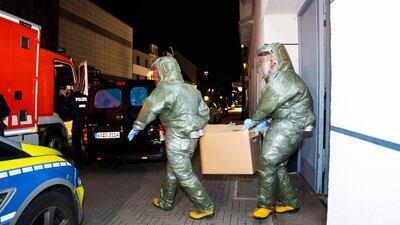German counter-terrorism police were hunting for a possible chemical weapons stash on Monday after two Iranian brothers were accused of plotting an attack.
A special police unit searched two garages belonging to one of the suspects early on Monday.
It came after a search of his house failed to find traces of the ricin or cyanide he had allegedly procured.
The suspect, 32, and his brother, 25, were arrested early on Sunday after a tip-off from a foreign intelligence agency, believed to be the American FBI.
Prosecutors were alarmed sufficiently to arrange a raid that very night in Castrop-Rauxel, western Germany.
In a statement to The National, prosecutor Holger Heming said the brothers were accused of planning an attack "motivated by Islamism" that would kill an unknown number of people.
The charge of conspiracy to murder could carry a prison sentence of three to 15 years if they are found guilty, he said.
German Interior Minister Nancy Faeser said the country was still a terrorist target despite ISIS supporters shrinking in number.
Police were examining how close the brothers had been to executing the alleged plot, as a judge ordered them to be held in custody.
The two men were identified only as Iranian nationals M.J. and J.J.
Herbert Reul, interior minister of the state of North Rhine-Westphalia, said they could be the latest example of lone-wolf plotters planning an attack without an elaborate terrorist network behind them.
“The number of dangerous people has got a little bit smaller but the abstract danger remains high. It can happen at any time,” he told German television on Monday.

The home searched early on Sunday was not contaminated but electronic media was seized.
The garages were searched on Monday after the link to one of the suspects was discovered.
A Tunisian couple received long prison terms in a similar case in 2020, in which they were found guilty of plotting a deadly ricin attack.
The substance derived from castor beans is a highly toxic biological agent that can kill anyone who inhales it.
Although there are no known cases of a mass ricin attack, there have long been concerns about its use by terrorist groups.
Ms Faeser said 21 attacks by Islamic extremists had been prevented in Germany since the turn of the century.
The tip-off from abroad led to some criticism that Germany had failed to identify the potential threat, and suggestions that the prospect of extremist plots was being ignored.
A suspected right-wing coup plot uncovered last month turned the attention of authorities to Germany’s far-right scene.

Mr Reul said co-operation with foreign intelligence was positive but German authorities lacked the power to go further.
“The important thing is that you know early who is planning what and who they might be in contact with,” he said.
About 28,000 people in Germany are thought to have sympathies with Islamist terrorism, 2,000 of whom are considered potentially violent.
Germany’s worst such attack came in 2016 when an ISIS supporter killed 13 people by driving a lorry into a Christmas market in Berlin.
Another ISIS sympathiser stabbed two people, killing one, in Dresden in 2020.
Ms Faeser on Monday said Germany would show “zero tolerance” to any enemies of the democratic state.
“Anyone who wants to take up arms against our democracy must know that our state will defend itself with all its strength,” she said.


